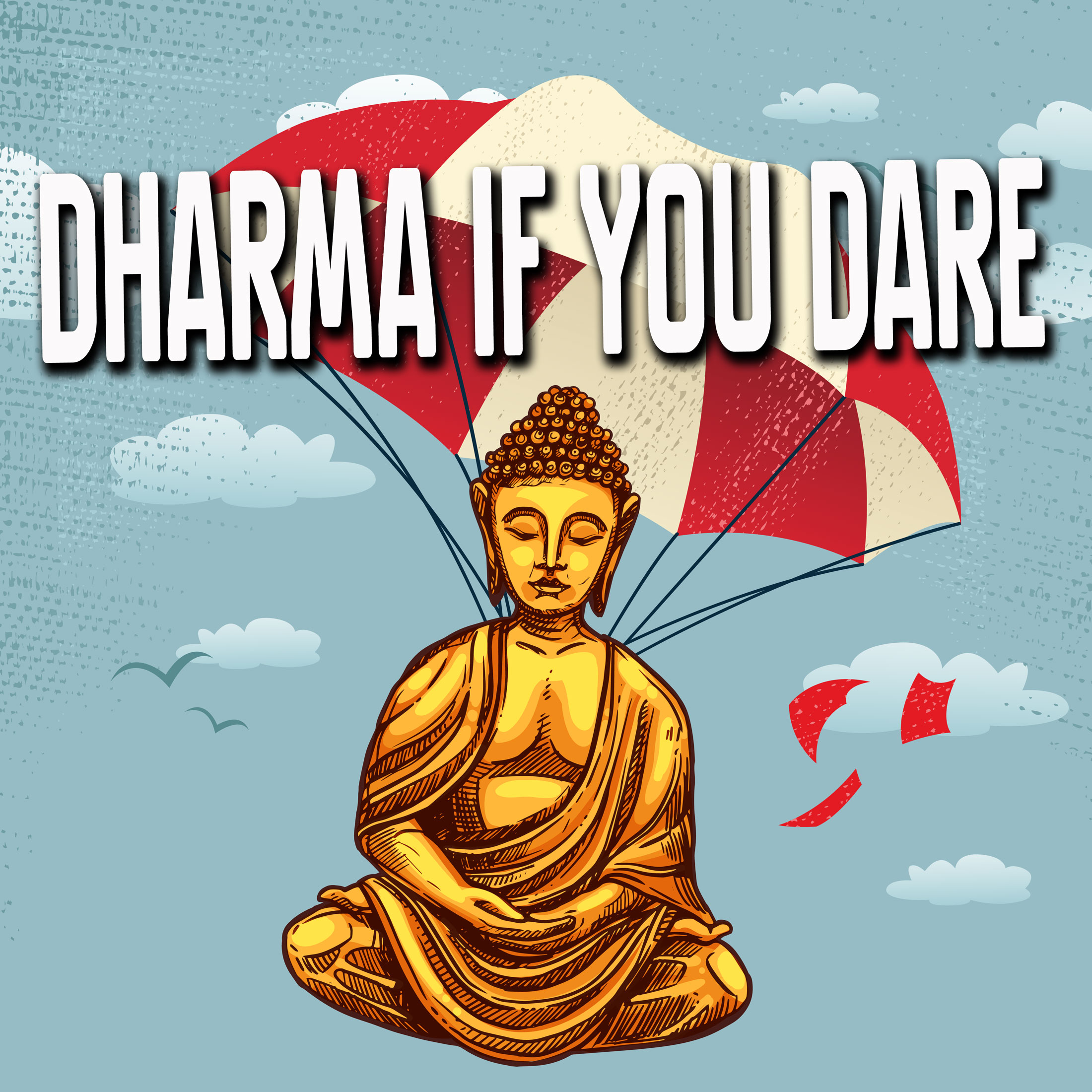Episodes

Tuesday Mar 20, 2018
What You Need to Live a Wholesome Life
Tuesday Mar 20, 2018
Tuesday Mar 20, 2018
The paramis are Buddhist teachings that allow you to overcome bad habits and transform them into more wholesome ways of being. When applying these principles in our daily lives, unnecessary suffering cannot arise.
In this talk, Doug and Catherine give an overview of the paramis and explain their power and practicality.
This episode is an excerpt from Planet Dharma’s 2017 online course, Right Effort – Healing the Splits Within. To learn more about Planet Dharma's teachings and programs, visit planetdharma.com/podcast.

Thursday Dec 07, 2017
Why Comfort Creates Suffering
Thursday Dec 07, 2017
Thursday Dec 07, 2017
There’s a sense of safety with feeling comfortable. But comfort often goes hand-in-hand with habit, routine and ultimately suffering. It’s time to get comfortable with being uncomfortable.
In this talk, Doug and Catherine explore the low-grade angst that exists when we cling to comfort and explain how not seeking comfort is not the same as seeking discomfort.
This episode is an excerpt from Planet Dharma’s 2017 online course, Right Effort – Healing the Splits Within. To learn more about Planet Dharma's teachings and programs, visit www.planetdharma.com/podcast.

Saturday Aug 05, 2017
Why Guru Yoga?
Saturday Aug 05, 2017
Saturday Aug 05, 2017
"Lama Rinpoche, to you I supplicate." Even if you're fully awakened, you still say that.
Why?
To overcome pride, which is very subtle!
http://www.planetdharma.com/

Thursday Dec 12, 2013
On Traditional Wisdom
Thursday Dec 12, 2013
Thursday Dec 12, 2013
How do you live and move and recognize in your world? What are the patterns and structures of how the mind works, whether hunger/gatherer or food grower or living in the modern world?
---
Doug Sensei gives an interview on an upcoming talk he will give on traditional wisdom in Australia in December 2013.

Saturday Nov 30, 2013
Pattern Recognition
Saturday Nov 30, 2013
Saturday Nov 30, 2013
The spiritual teachings are focused on drawing your attention to the awakened/awakening consciousness. The real purpose of awakening is it puts you in a position where it's just much easier to learn without a lot of baggage.
---
From an interview conducted in October 2013 with Doug Duncan Sensei...
Well again, it's mapping, it's patterning. I won't go into those particularly, but pattern recognition. It's what the human consciousness is particularly good at. "Oh, winter's coming. Oh, nuts are under the snow. Hmmm…. let's build a shed, put the nuts in the shed. I can get to the shed. I can't get under the snow." It's a kind of pattern recognition.
So, cabbalistic teachings, Christian teachings, Islamic teachings, Buddhist teachings… it's all about pattern. It's all recognizing pattern, seeing how things work, how things tie together -- psychology, science, mysticism. It's all patterns. "Occult" means "hidden" -- that which is hidden -- so if you're an occultist, you're studying that which is hidden. Science is "anti-occultism." You're studying that which is apparent. Although, I suppose if you're a quantum physicist the distinction starts to (laughs)… starts to fall away.
So, everything is teaching. Everything is a potential teaching -- human relationships, psychology, marriage -- again, pattern. What kind of patterns evolve in relationship? Guru/student, teacher-guide/adept relationships. What's the patterning? How does that patterning work? Who gets the high seat? Who gets the low seat? What pattern is involved in that?
So, when one is hurt, one tends to see other people's patterns as being abusive. When one is in a state of loving-kindness, one tends to see other people's patterns as being abusive, but not so much to oneself as to others...well, to oneself and the person who is suffering.
So the idea is that as you become more and more conscious of patterns, you become more and more conscious of the interconnecting factors in those patterns. You see that more and more everything is a teaching -- science, art, music, relationship. The spiritual teachings are teachings that are focused particularly on trying to draw your attention to the awakened/awakening consciousness. And from many perspectives, the real purpose of awakening is it puts you in a position where it's just much easier to learn without a lot of baggage.
So, if you were going to take a shower, would you go in with your clothes on? Or would you go in naked? The idea is you go in naked, because it's much easier to get clean that way and much easier to have that experience. So, too, the transcendent nature is getting naked to life so that you can be washed or have the experience more fully. Having clothes on in the shower, you might get cleaner than you were when you went in, but there's a lot of unnecessary dukkha/struggle in that. The nature of spiritual teachings is to bring you closer to fundamental patterns of how consciousness works and how the self, the ego, gets structured and therefore caught up, and so on.
So, whether it's caballistic teachings or Buddhist teachings, or whatever, the idea -- the core understanding -- remains the same. "What is this thing called 'transcendent consciousness'?" "How do I recognize it and how do I live it?" And from there you go to other teachings, like science, art, music, and so on… business.

Wednesday Oct 30, 2013
All Suffering Is Self-Created
Wednesday Oct 30, 2013
Wednesday Oct 30, 2013
The 'you' -- is an illusion...because 'you' aren't there. And if you knew that, the 'you' would disappear. It would evaporate like a fog.
---
Transcript
Student: The ego is hurt...somebody steps on you.
Doug Sensei: "The definition of 'you' is 'hurt'. Be very clear about this. 'You' is 'separation'. Separation is, by definition, hurt. You don't want to know the cruel taskmaster who owns you -- the 'you' -- is an illusion...because 'you' aren't there. And if you knew, the 'you' would disappear. It would evaporate like a fog. You don't want to know that 'you' are an illusion -- an image in a mirror, a reflection in a pond. You want 'you' to be there, and so you purposely get distracted. It's a choice to be distracted. And in that distraction you appear.
(That's the problem with all these you's.) If you are not distracted, you dissolve. And then there's bliss; clarity; non-clinging awareness. But your program -- the whole story of you, the whole story of 'me' -- is to be distracted. The minute I'm not distracted, I'm not there anymore.
There's sensation; there's perception; there's cognition; but none of those things make a 'me' until I attach to this one and push off of that one.
So why does suffering continue? This is a hard one. Are you ready? Because you want it to…. Ouch.
All suffering is self-created."
http://www.planetdharma.com/

Saturday Oct 19, 2013
Basic Trust in the Universe
Saturday Oct 19, 2013
Saturday Oct 19, 2013
The first step in spiritual awakening is becoming aware of our ego structure -- actually perceiving the particular beliefs and images that we have identified with and taken to be true -- then dissolving that, letting go of that part of one's identity.
---
Doug Sensei teaches on the enneagram, drawing from this source:
Facets of Unity: The Enneagram of Holy Ideas by A.H. Almaas, 1998; Chapter 4, Basic Trust
Search inside:
http://books.google.com/books/about/Facets_of_Unity.html?id=gdTz5Mt0WtgC&redir_esc=y
Extended paraphrase:
The ego is a psychic structure that is based on crystallized beliefs about who we are and what the world is. We experience ourselves and the world through the filter of this structure. Spiritual awakening involves connecting with those dimensions of experience obscured by ego structure.
The first step is becoming aware -- actually perceiving the particular beliefs and images that we have identified with and taken to be true -- then dissolving that facet of the ego structure. This means letting go of part of one's identity, which can be painful or frightening because the old sense of your identity crumbles and you don't know what will take its place. Letting go of what has felt real feels like jumping into an abyss.
The jumping can be easy or difficult depending on the presence of "basic trust" -- the sense that whatever happens will ultimately be fine. The ego's perspective arises out of a lack of this trust. It is based on distrust, paranoia, and fear that the universe will not take care of you in the ways that you need. Basic trust is a confidence that the universe and human nature is fundamentally good and loving, that life is fundamentally benevolent. It will help you take that plunge.
You don't need assurances that things are going to be okay because you implicitly know things are going to be okay. Basic trust gives you the capacity and willingness to let go of the identifications, beliefs and concepts -- remnants of the past -- that make up the ego.
If you don't have basic trust, you will react to what arises in accordance with your conditioning and will want things to go one way or another, rather than to just be, without reacting, which is allowing the ego to die. The more that basic trust is present, the more smoothly the process of realization and transformation can proceed.
If we lack basic trust, it is important to develop it. With basic trust, our lives have a sense of freedom. The desire to know where things are going arises out of simple curiosity rather than a desire to control the unfoldment. Tension and stress from constantly struggling and fighting with our reality become relaxed into a sense of peace that allows a spontaneous and natural unfoldment of one's being. A new outlook emerges, allowing us to see that whatever happens is right even if it's painful. Things that we had thought were bad turn out not to be bad.

Saturday Oct 05, 2013
Why Practice the Paramis? (Part 2 of 2)
Saturday Oct 05, 2013
Saturday Oct 05, 2013
Part 2: Paralyzed and Free!
A quadriplegic man in the hospital for 25 years sees the spaciousness through which all manifestations can arise, including the mind. Was no longer obsessed with the arisings.
---
Part two of the "Why Practice the Paramis?" podcast from Aug. 23, 2013.
The "he" referred to at the beginning is "Gerry," who was laid up in the hospital for 8 weeks unable to move. This talk was originally given on Dec. 13, 2007, in Kyoto, Japan.
http://www.planetdharma.com/

Friday Aug 23, 2013
Why Practice the Paramis? (Part 1 of 2)
Friday Aug 23, 2013
Friday Aug 23, 2013
The paramis are qualities of character, or "perfections" of heart and mind that can be developed to support the path of awakening--practices which develop wholesome activity, growth and enlightenment. "It is so clear that the Teaching is the only refuge."
---
What are the paramis?
They are qualities of character, or "perfections" of heart and mind that can be developed to support the path of awakening--practices which develop wholesome activity, growth and enlightenment.
In the Theravadin school of Buddhism there are ten. In Mahayana, six, considered to indicate a sequence of development: generosity, virtue (coolheadedness), patience, energy, concentration, and wisdom.
For more on the paramis, search for "A Guide to the Bodhisattva's Way of Life" or "paramita." Also, "The Path Of Victory: Discourses on the Paramita" by Namgyal Rinpoche can be ordered from BodhiPublishing.org
Transcript:
Why practice the paramis? Well, as you remember, if you had a turban and it was in flames, what would you do? You'd put it out... or take it off. And so, to extinguish the flames of craving you must apply the antidote and the antidote is... the paramis. Simple as that. You are in a burning pit of passion, desire, fear, hope, ambition, worry, anxiety, wishful thinking. You know, "When my prince comes, when my house is paid for, when the banks get it all straightened out, everything will be fine." No it won't. Then you'll be 60 and you'll have a heart attack... or something.
I talked to Gerry today, you remember Gerry? He's walking now, which is good, very fast [recovery]. They call him the poster boy for rehab. He was supposed to be in rehab for 3 months, but it looks like he'll only be there a month and he can walk with a walker.
He said to me today, "You know, Sensei, I hate to say it, but this has been absolutely, totally, fantastically marvelous." Crushed from the knee to the ankle, thinking he'd never walk again, losing both the lower parts of his legs, having them rebuilt.
He's walking, it's good, he's walking and he's probably happier than if he didn't obviously, and he wouldn't wish it on anyone, but he said "This was the most amazing experience of my life. It is so clear, it is just so absolutely clear that the Teaching is the only refuge."
Because everybody else is busy. What are they doing when you're in hospital for six weeks, or in this case, two months? Moving on. When you're sitting there in the hospital bed for two months, what are they doing? Going to movies, having suppers, talking to their friends, oh, calling you once a week to see how you're doing. Maybe you get an hour of their time and then mostly they're going, "Well, okay, gotta go."
He said it brought the teachings so home. The only refuge you have is your state in the moment and the only thing that maintains your state in the moment are the paramis. There is no other place to go except busyness, and the nature of busyness does exactly what? It hides the nature of your clinging. The more busy you are—and I'm not saying you shouldn't be busy; it's fine to be busy—but what I'm saying is that the busier you are the less visible it is—the clinging that's going on. When you're in your hospital room and you got nowhere to go, you're just left with it—the body and you: clinging. And you have to be in the moment. You have to give up... you have to let the passions and the feelings come and go. You have to give them up. You have to surrender them. You have to surrender your impatience with the process. You can't move.
He wasn't supposed to move off his back for six weeks. Don't move, they told him. Never mind go for a walk. Don't move. Because your flesh is building...in his leg and if he moves them he disturbs them.
Patience isn't something you have any choice about. Coolness—you either do that or you lose your mind, which many people do in those circumstances, they go bananas. They throw things at the nurses, they scratch them, they kick, they bite. Because they're freaking out. I mean, can you imagine... weeks without moving on your back if you have no training, no mental training, no training in the mind? I mean all of a sudden... you know, you've been busy being Joe-head-of-your-department and all of a sudden you're in the hospital. You've got nothing.

Tuesday Apr 30, 2013
Bliss Arises
Tuesday Apr 30, 2013
Tuesday Apr 30, 2013
Bliss is present because there is no one trying to do anything. Be very clear about this: bliss arises when you no longer try to do anything.
---
A one-minute excerpt from a talk by Doug Sensei on the Diamond Sutra held at Zofukuji Temple, Miki, Japan, on Jan. 4, 2013. You'll want to listen to this one over and over again.
Transcript:
"Bliss is present because there is no one trying to do anything. Be very clear about this: bliss arises when you no longer try to do anything. Whether it's a golf shot, a poem, a recipe, or singing a song in a band. You're not trying anymore. The minute you don't try to do anything, there it is -- the flow, I guess. You only can be a samurai when you realize you are already dead. The minute you put in a defensive motif of any kind it tightens your muscles, it slows down your reaction time, puts you in a sense of separation […] So, recognize awakening is... you already have to see your life as being over. My life is over. MY life is over. There's just life. My preferences and non-preferences are over. There's just options."
http://www.planetdharma.com/

